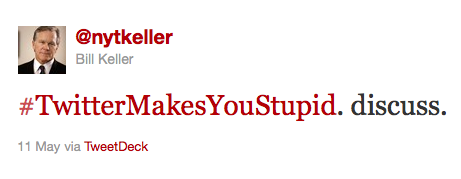Every week we round up media & tech industry news you may have missed while you were busy being raptured.
(Typically in this situation, one would link to Keller’s piece, but Times reporters Jacob Harris and Patrick LaForge helpfully informed us all this week that links are not essential to online writing.)
Keller’s column predictably elicited howls from all around, with one of the more sensible critiques coming from the Times‘ tech writer Nick Bilton:
There is a fear by many, Mr. Keller included, that these devices will wipe out our ability to remember and force us to become dependent on the virtual world. Luckily for us humans, our brains do not work this way. Research shows that the human brain is capable of adapting to new technologies in less than a week, irrelevant of age or intellect.
As I’ve written in the past, Maryanne Wolf, the director of the Center for Reading and Language Research at Tufts, points out that our brains were never even designed to read. This “technology” is something that we have to train our brains to do.
In the same way that we hack our brains to read, we are not going to flush away our powers of memory by adopting tomorrow’s technologies.
Felix Salmon took a harsher tone:
Keller’s latest column, with its nostalgia for a time before slide rules and even the printing press, is an indication that he’s utterly incapable of leading a 21st-Century news organization into the future.
And Gawker says Keller should spend more time editing his newspaper instead of writing embarrassing columns:
The real problem with Keller’s columns is not just that they’re wrong (as they often are), but that they are so obvious. Bill! This conversation has already happened. It’s happened so much that I can barely even bring myself to engage in the argument any more, because I’ve heard every variation on it dozens or hundreds of times already. And I agree with you! But Jesus Christ, Bill, you’re hogging a valuable media platform that could be used to say something, you know, interesting.
The biggest thing that’s missing in the journalistic establishment is people who are good at finding all that great material, and collating it, curating it, adding value to it, linking to it, presenting it to their readers. It’s a function which has historically been pushed into a blog ghetto, and which newspapers and old media generally have been pretty bad at. And of course old media doesn’t understand blogs in the first place, let alone have the confidence or the ability to incorporate such thinking into everything they do.
Think about it this way: reading is to writing as listening is to talking — and someone who talks without listening is both a boor and a bore. If you can’t read, I don’t want you in my newsroom. Because you aren’t taking part in the conversation which is all around you . . .
. . . if I were hiring, the first thing I’d look at would be the prospective employee’s Twitter feed. What are they linking to? What are they reading? If they’re linking to great stuff from a disparate range of sources, if they’re following smart people on Twitter, if they’re engaged in the conversation — that’s hugely valuable. More valuable, in fact, than being able to put together an artfully-constructed lede.
News Archive was generally a good deal for newspapers — especially smaller ones like ours, who couldn’t afford the tens or hundreds of thousands of dollars it would have cost to digitally scan and index our archives — and a decent bet for Google. It threaded a loophole for newspapers, who, in putting pre-internet archives online, generally would have had to sort out tricky rights issues with freelancers — but were thought to have escaped those obligations due to the method with which Google posted the archives.
Think about NOT waiting your turn.
Instead, think about getting together with friends that you admire, or envy. Think about entrepeneuring. Think about NOT waiting for a company to call you up. Think about not giving your heart to a bunch of adults you don’t know. Think about horizontal loyalty. Think about turning to people you already know, who are your friends, or friends of their friends and making something that makes sense to you together, that is as beautiful or as true as you can make it.
And when it comes to security, to protection, your friends may take better care of you than CBS took care of Charles Kuralt in the end. In every career, your job is to make and tell stories, of course. You will build a body of work, but you will also build a body of affection, with the people you’ve helped who’ve helped you back.
And maybe that’s your way into Troy.








